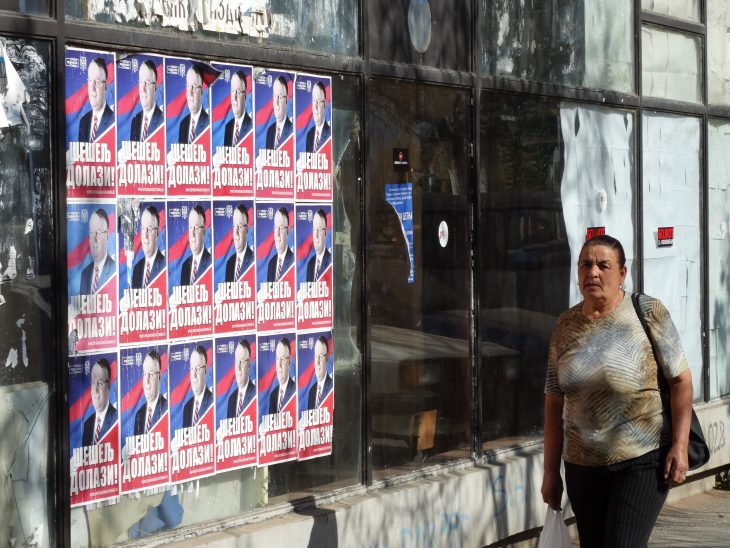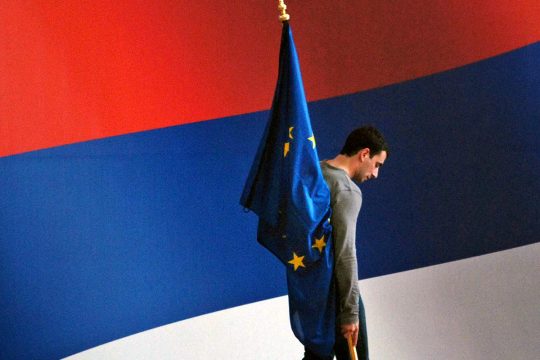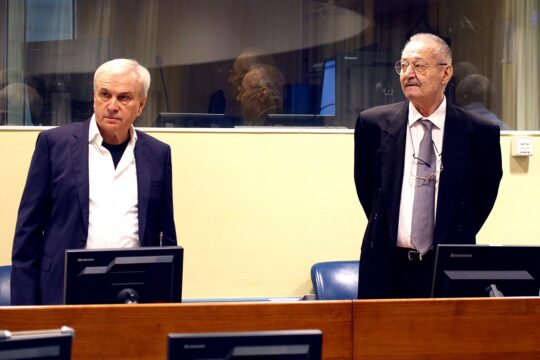UN war crimes judges Thursday acquitted radical Serb leader Vojislav Seselj on all nine charges of committing atrocities in the 1990s Balkans wars in a surprise verdict swiftly denounced as "shameful" by Croatia The three-judge panel found by a majority that the prosecution "had failed to prove beyond all reasonable doubt" or provide sufficient evidence that Seselj was responsible for the crimes with which he was charged. "Vojislav Seselj is now a free man," declared French judge Jean-Claude Antonetti at the International Criminal Tribunal for the former Yugoslavia (ICTY).
The acquittal clears the way for the firebrand leader of the Serbian Radical Party to stand unencumbered in next month's general election in Serbia, and he welcomed the verdict as "honourable and fair."
Seselj, 61, had faced nine charges of war crimes and crimes against humanity over his unrelenting quest to unite "all Serbian lands" in a "Greater Serbia".
Prosecutors had alleged he was behind the murders of many Croat, Muslim and other non-Serb civilians, as well as the forced deportation of "tens of thousands" from large areas of Bosnia-Hercegovina, Croatia and Serbia.
"Confusion and ambiguities"
But the judges by a majority said the prosecution had failed to prove "that there was a widespread and systematic attack against the non-Serb civilian population in large areas of Croatia and Bosnia Hercegovina".
And although crimes were committed, Seselj was not the "hierarchial superior" of his paramilitary forces after they came under the control of the Serbian army and therefore not responsible for what they did.
"The totality of the evidence substantiates the fact that the purpose of sending volunteers was not to commit crimes, but to support the war effort," Antonetti said.
He slammed the prosecution case as full of "confusion" and "ambiguities," saying it failed to put events in their broader context.
The prosecution had given "at best an interpretation that hides the way the events unfolded and at worst distorts them in relation to the evidence presented to the chamber," Antonetti said. Chief prosecutor Serge Brammertz said he was surprised by the verdict, and was considering an appeal saying many of the judges arguments were "not in line with the factual reality".
"We understand that many victims will be disappointed. We in a large part share their frustrations," he told reporters.
Seselj, who was excused from attending the judgement on medical grounds after returning to Belgrade in 2014 for treatment for colon cancer, hailed his acquittal.
"This time, after all the trials that accused innocent Serbs who received draconian sentences, two judges appeared who are honourable and fair people," he told reporters.
"no law in times of war"
Croatia's Prime Minister Tihomir Oreskovic however was dismayed. "The verdict is shameful. It is the defeat of The Hague court and the prosecution," he said.
"He is a man... who committed evil and did not show any remorse, neither then nor today."
And in an unusually strong dissenting opinion, judge Flavia Lattanzi said she "felt I was thrown back in time to a period in human history, centuries ago" when there was no law in times of war. "The majority sets aside all the rules of international humanitarian law that existed before the creation of the tribunal and all the applicable law established since the inception of the tribunal." The judgement comes exactly a week after former Bosnian Serb leader Radovan Karadzic was sentenced to 40 years in jail for genocide and nine other charges by the same court.
While the judges agreed that "Seselj was driven by an ardent political ambition to create a Greater Serbia" during the Balkans wars, they ruled this was in "principle a political plan, not a criminal plan".
And they argued that "a lot of the evidence shows that the collaboration (by Seselj) was aimed at defending the Serbs and the traditional Serb territories, or at preserving Yugoslavia, not at committing the alleged crimes".
Some of Seselj's inflammatory speeches such as outside Vukovar in 1991, a Croatian town razed by Serb forces, "were made in a context of conflict and were meant to boost the morale of the troops... rather than calling upon them to spare no one".
Experts appeared surprised at the ruling.
"This looks to me like a collateral error on the part of the majority of the trial chamber," Goran Sluiter, professor of international law at the University of Amsterdam, told AFP. Seselj gave himself up in 2003 and his trial started in 2006, but was halted only weeks later after he went on hunger strike. It was then nullified. A new trial started in late 2007 and proceeded with multiple delays until the closing arguments in March 2012.






